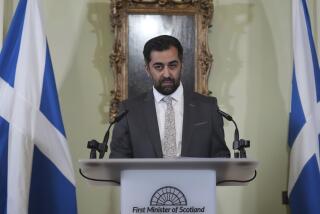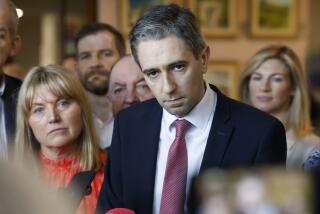N. Ireland in a Political Bind as Trimble Resigns
- Share via
LONDON — Nobel Peace Prize laureate David Trimble resigned as first minister of Northern Ireland today, casting doubt on the future of the province’s 2-year-old power-sharing government.
Trimble stepped down to protest the Irish Republican Army’s refusal to disarm under the 1998 Good Friday peace agreement. The Ulster Unionist Party chief named a caretaker of the government, but his resignation creates a political vacuum at the outset of the Protestant Orange Order’s potentially violent “marching season.”
Under the terms of the Protestant-Roman Catholic power-sharing plan, Trimble’s resignation automatically removes nationalist leader Seamus Mallon from his duties as deputy first minister.
Reg Empey, a member of Trimble’s party and the trade and enterprise minister in the 12-member Cabinet, confirmed that he will assume Trimble’s ministerial duties to try to keep the government running temporarily.
“Mr. Trimble’s resignation is effected. There will be no first minister and no deputy first minister,” Empey said on BBC Radio Ulster. “We will take the necessary measures as a party to ensure the government is able to function. This is only a sticking plaster [Band-Aid] solution for a very short time.”
Empey blamed the IRA and its political allies in government, Sinn Fein, for the crisis, saying that too many deadlines for disarmament have come and gone without the destruction of any weapons.
“Quite frankly, people are sick and fed up with it. Republicans are trying to use their weapons to negotiate, to renegotiate and renegotiate on a whole series of issues,” Empey said.
But Sinn Fein leader Gerry Adams threw the blame back onto Trimble and his “kamikaze politics.”
“I think if he was truly committed to the Good Friday agreement, he would not resign,” Adams said in a brief telephone interview. “He will learn that the process of change is bigger than any one of us.”
At a book signing in Dublin, the Irish capital, Adams was asked about the prospect of IRA moves on disarmament in the coming weeks.
“If the whole process is going to be predicated upon the issue of weapons, when weapons aren’t the problem, then the whole process I think becomes counterproductive,” he said.
Trimble set the stage for his resignation in a postdated letter that he handed to the speaker of the Northern Ireland Assembly, John Alderdice, in May, ahead of elections for members of the British Parliament at Westminster and of local councils.
It was not the first time that Trimble had threatened to resign.
He led the pro-British Protestant majority into the peace process in 1998 promising that the peace agreement would devolve power from London to Belfast and lead to the disarmament of the Irish Republican Army. He formed a Cabinet with Sinn Fein in 1999, but when no weapons were forthcoming, he announced plans to quit, forcing British authorities to suspend the power-sharing government in February 2000.
The following May, the government was reestablished on the heels of an IRA promise to put its weapons “completely and verifiably beyond use,” and the group subsequently allowed international observers to inspect its secret arms dumps.
But Trimble’s Protestant base was growing impatient and suspicious that the IRA planned to hold on to its guns while increasing its power at the polls.
Trimble’s party lost ground to anti-agreement Protestants in the elections three weeks ago, while Sinn Fein gained seats at the expense of Mallon’s moderate nationalist party.
In his letter, Trimble said his resignation would not “cause the [government] institutions to collapse. However, a clear onus is now placed on Republicans and others to act to preserve them.”
Adams said Trimble’s attempt to pressure the IRA would backfire, just as British and Protestant efforts to force its hand have failed in the past.
“The UUP can no more pressurize the IRA than the IRA can pressurize the UUP,” Adams told the Irish Times newspaper last week.
“For my part, an essential objective of the peace process is creating the circumstances in which the IRA and other armed groups become part of our past. Some want to see the IRA defeated. I want to see it in happy retirement. But that goal will be easier to achieve if parties to the agreement work together,” he said.
By law, the two sides have a six-week grace period in which to resolve the political impasse and possibly reinstate Trimble as first minister. If they fail to come to an agreement, either British officials will have to suspend Northern Ireland’s government again and resume direct rule or elections will have to be held for a new Assembly.
On Monday, Alderdice will officially advise the Northern Ireland Assembly of Trimble’s resignation, and at the end of the week the legislature will adjourn for its summer recess.
Canadian Gen. John de Chastelain, head of the independent commission monitoring disarmament, is to issue a report on Monday or Tuesday, but it is expected to say there has been no significant progress.
British and Irish officials are to resume negotiations with the main political parties in Northern Ireland this week, but little progress is expected until British Prime Minister Tony Blair and his Irish counterpart, Bertie Ahern, get involved again the following week.
By that time, however, some of the most contentious Orange Order marches alongside or through Catholic neighborhoods will be taking place, beginning with the disputed Drumcree parade in Portadown on July 8.
Blair and Ahern most likely will try to hammer together a package of measures in which the IRA will begin to disarm in exchange for concessions on the organization of the new Northern Ireland police force and on the British military presence in the province.
Whether such a package would include the return of Trimble is far from clear.
*
Special correspondent William Graham in Belfast contributed to this report.
More to Read
Sign up for Essential California
The most important California stories and recommendations in your inbox every morning.
You may occasionally receive promotional content from the Los Angeles Times.













